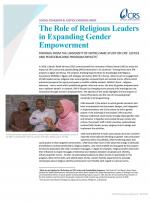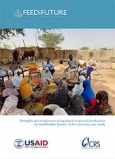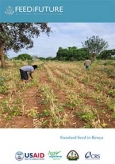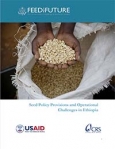Learning Briefs | December 10, 2020
The Role of Religious Leaders in Expanding Gender Empowerment
In 2018, Catholic Relief Services (CRS) commissioned the University of Notre Dame (UND) to study the impact of CRS’ justice and peacebuilding (JPB) investments in six countries. Among these were JPB projects in Egypt and Kenya. The projects, Building Opportunities for Knowledge and Religious Acceptance (BOKRA) in Egypt, and Dialogue and Action (DAP II) in Kenya, relied in part on engagement of faith leaders across religious lines around gender empowerment and societal norms, efforts which enhanced prospects for equity and peace in conflict-volatile contexts. BOKRA’s focus - religious tolerance - was to work within established gender roles and norms; the level of gender empowerment was a spillover benefit. In contrast, DAP II focused on changing norms around child marriage but not necessarily through women’s empowerment.





